Business Valuation: Evaluating Approaches and Small Business Issues
VerifiedAdded on 2023/06/13
|7
|1544
|340
Report
AI Summary
This report provides a comprehensive overview of business valuation, detailing its purpose, methods, and practical applications. It begins by defining business valuation and its significance in various scenarios, such as sales, dissolution, and ownership transfer. The report explores key issues, including the reluctance of small business owners to invest in valuation and the importance of valuation in cases of owner incapacitation, mergers, loan applications, risk assessment, and divorce settlements. It contrasts the approaches of accounting and law firms in conducting valuations and highlights the sophisticated techniques used by large companies, such as earnings-based valuation, industry comparisons, discounted cash flow analysis, and leveraged buyouts. The report evaluates the main issues by considering the availability of information and the operational practices of small businesses. It concludes by emphasizing the importance of valuation for all businesses and recommending that business owners regularly undertake valuation to improve performance and understand their position in the economy. The report also critiques the article for not providing guidance on selecting the appropriate valuation professionals. Desklib offers similar solved assignments and past papers for students.
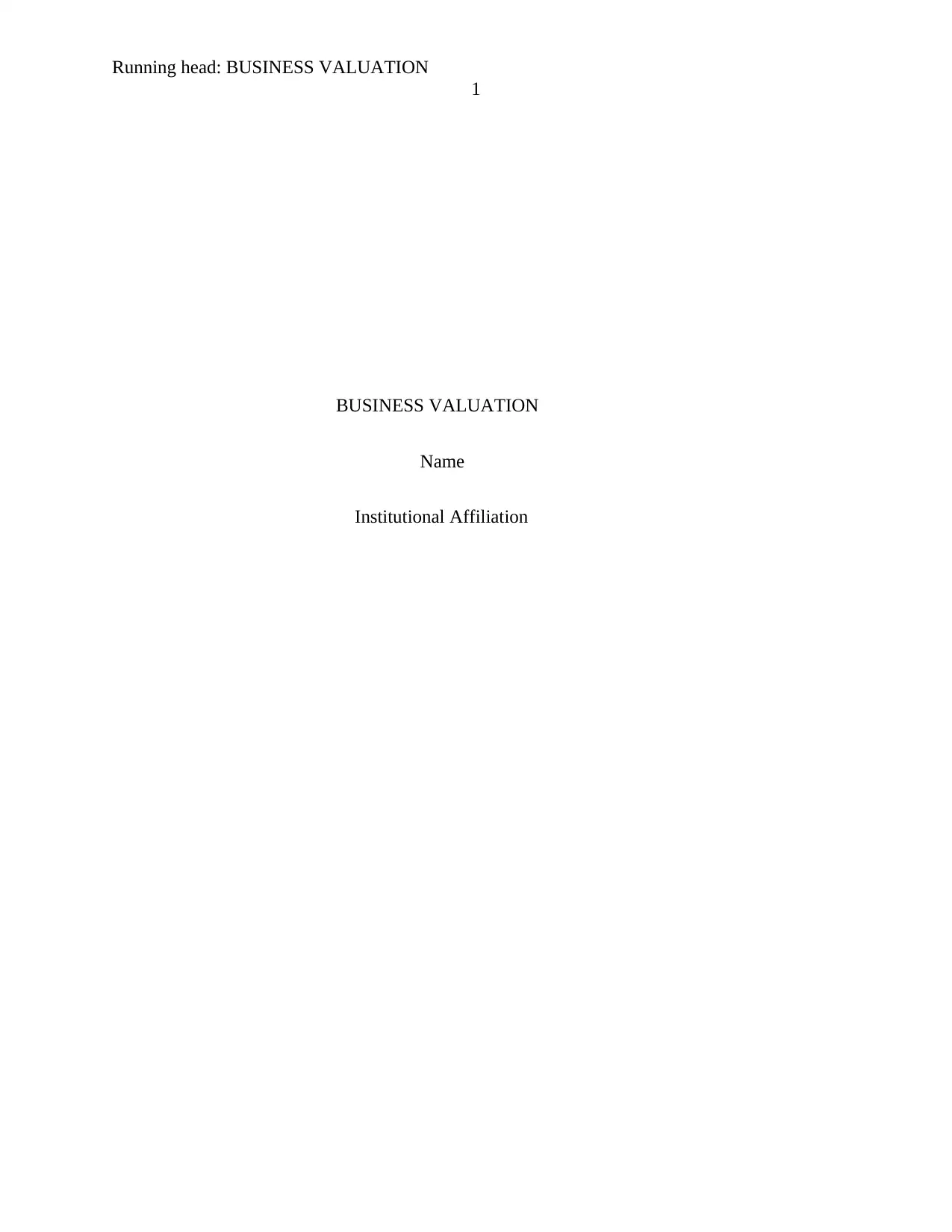
Running head: BUSINESS VALUATION
1
BUSINESS VALUATION
Name
Institutional Affiliation
1
BUSINESS VALUATION
Name
Institutional Affiliation
Paraphrase This Document
Need a fresh take? Get an instant paraphrase of this document with our AI Paraphraser
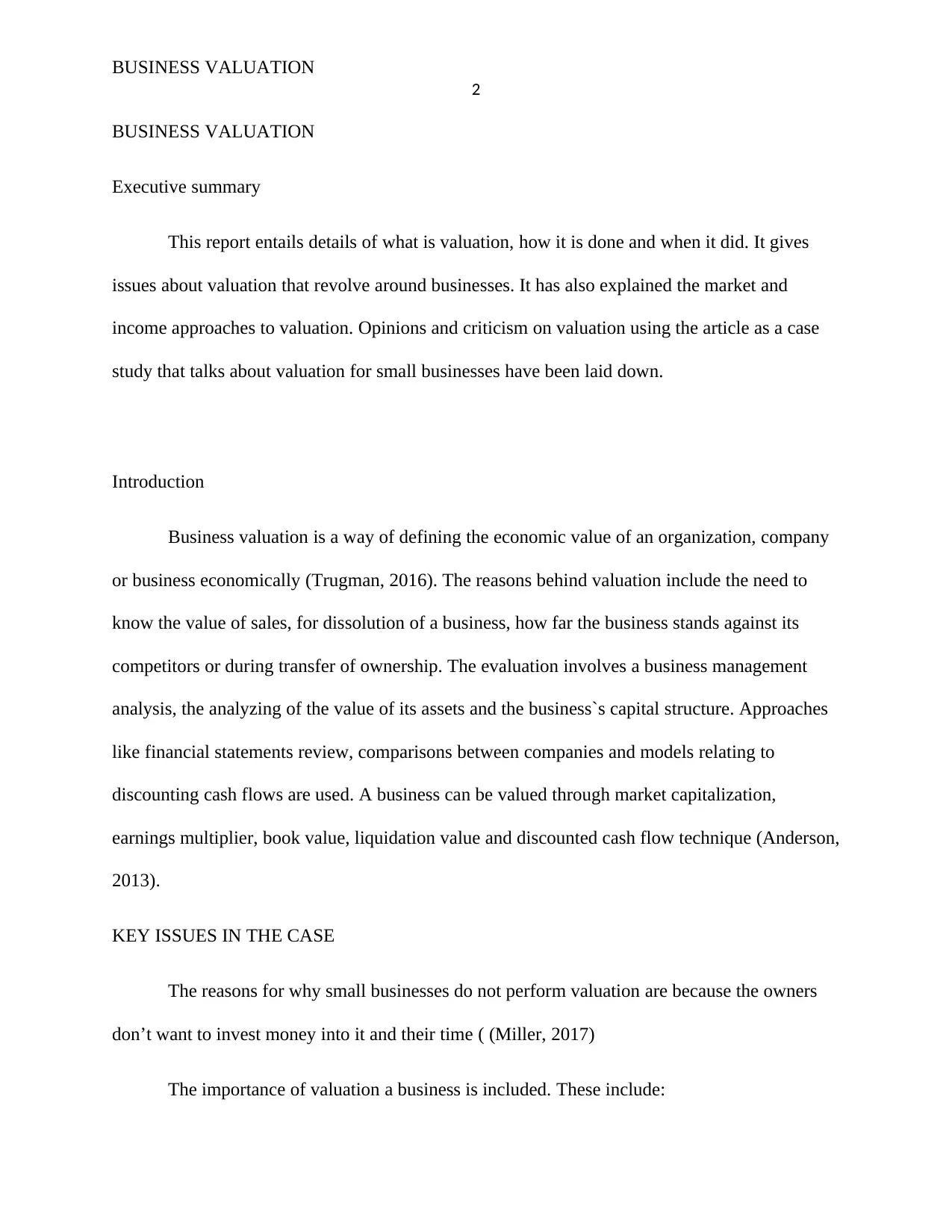
BUSINESS VALUATION
2
BUSINESS VALUATION
Executive summary
This report entails details of what is valuation, how it is done and when it did. It gives
issues about valuation that revolve around businesses. It has also explained the market and
income approaches to valuation. Opinions and criticism on valuation using the article as a case
study that talks about valuation for small businesses have been laid down.
Introduction
Business valuation is a way of defining the economic value of an organization, company
or business economically (Trugman, 2016). The reasons behind valuation include the need to
know the value of sales, for dissolution of a business, how far the business stands against its
competitors or during transfer of ownership. The evaluation involves a business management
analysis, the analyzing of the value of its assets and the business`s capital structure. Approaches
like financial statements review, comparisons between companies and models relating to
discounting cash flows are used. A business can be valued through market capitalization,
earnings multiplier, book value, liquidation value and discounted cash flow technique (Anderson,
2013).
KEY ISSUES IN THE CASE
The reasons for why small businesses do not perform valuation are because the owners
don’t want to invest money into it and their time ( (Miller, 2017)
The importance of valuation a business is included. These include:
2
BUSINESS VALUATION
Executive summary
This report entails details of what is valuation, how it is done and when it did. It gives
issues about valuation that revolve around businesses. It has also explained the market and
income approaches to valuation. Opinions and criticism on valuation using the article as a case
study that talks about valuation for small businesses have been laid down.
Introduction
Business valuation is a way of defining the economic value of an organization, company
or business economically (Trugman, 2016). The reasons behind valuation include the need to
know the value of sales, for dissolution of a business, how far the business stands against its
competitors or during transfer of ownership. The evaluation involves a business management
analysis, the analyzing of the value of its assets and the business`s capital structure. Approaches
like financial statements review, comparisons between companies and models relating to
discounting cash flows are used. A business can be valued through market capitalization,
earnings multiplier, book value, liquidation value and discounted cash flow technique (Anderson,
2013).
KEY ISSUES IN THE CASE
The reasons for why small businesses do not perform valuation are because the owners
don’t want to invest money into it and their time ( (Miller, 2017)
The importance of valuation a business is included. These include:
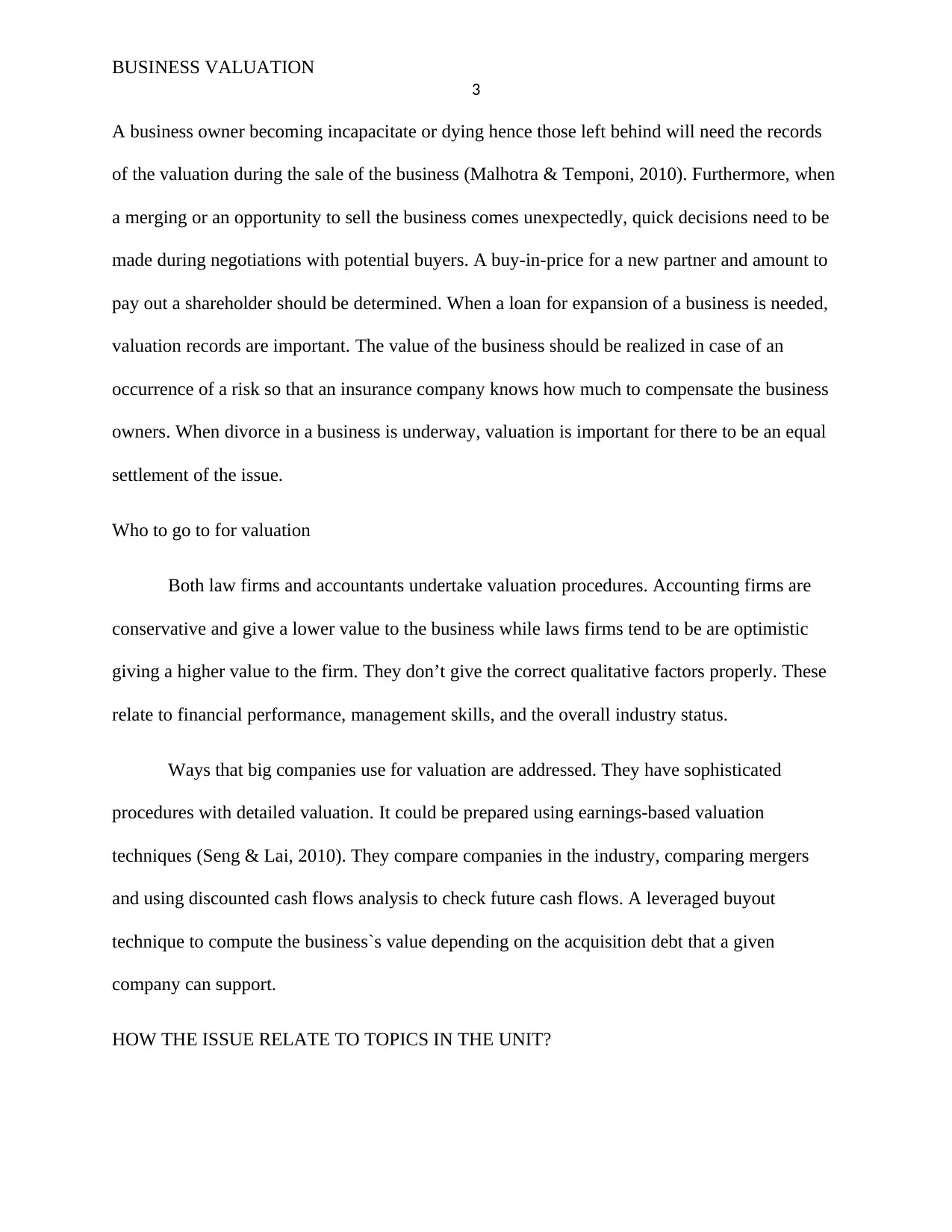
BUSINESS VALUATION
3
A business owner becoming incapacitate or dying hence those left behind will need the records
of the valuation during the sale of the business (Malhotra & Temponi, 2010). Furthermore, when
a merging or an opportunity to sell the business comes unexpectedly, quick decisions need to be
made during negotiations with potential buyers. A buy-in-price for a new partner and amount to
pay out a shareholder should be determined. When a loan for expansion of a business is needed,
valuation records are important. The value of the business should be realized in case of an
occurrence of a risk so that an insurance company knows how much to compensate the business
owners. When divorce in a business is underway, valuation is important for there to be an equal
settlement of the issue.
Who to go to for valuation
Both law firms and accountants undertake valuation procedures. Accounting firms are
conservative and give a lower value to the business while laws firms tend to be are optimistic
giving a higher value to the firm. They don’t give the correct qualitative factors properly. These
relate to financial performance, management skills, and the overall industry status.
Ways that big companies use for valuation are addressed. They have sophisticated
procedures with detailed valuation. It could be prepared using earnings-based valuation
techniques (Seng & Lai, 2010). They compare companies in the industry, comparing mergers
and using discounted cash flows analysis to check future cash flows. A leveraged buyout
technique to compute the business`s value depending on the acquisition debt that a given
company can support.
HOW THE ISSUE RELATE TO TOPICS IN THE UNIT?
3
A business owner becoming incapacitate or dying hence those left behind will need the records
of the valuation during the sale of the business (Malhotra & Temponi, 2010). Furthermore, when
a merging or an opportunity to sell the business comes unexpectedly, quick decisions need to be
made during negotiations with potential buyers. A buy-in-price for a new partner and amount to
pay out a shareholder should be determined. When a loan for expansion of a business is needed,
valuation records are important. The value of the business should be realized in case of an
occurrence of a risk so that an insurance company knows how much to compensate the business
owners. When divorce in a business is underway, valuation is important for there to be an equal
settlement of the issue.
Who to go to for valuation
Both law firms and accountants undertake valuation procedures. Accounting firms are
conservative and give a lower value to the business while laws firms tend to be are optimistic
giving a higher value to the firm. They don’t give the correct qualitative factors properly. These
relate to financial performance, management skills, and the overall industry status.
Ways that big companies use for valuation are addressed. They have sophisticated
procedures with detailed valuation. It could be prepared using earnings-based valuation
techniques (Seng & Lai, 2010). They compare companies in the industry, comparing mergers
and using discounted cash flows analysis to check future cash flows. A leveraged buyout
technique to compute the business`s value depending on the acquisition debt that a given
company can support.
HOW THE ISSUE RELATE TO TOPICS IN THE UNIT?
⊘ This is a preview!⊘
Do you want full access?
Subscribe today to unlock all pages.

Trusted by 1+ million students worldwide
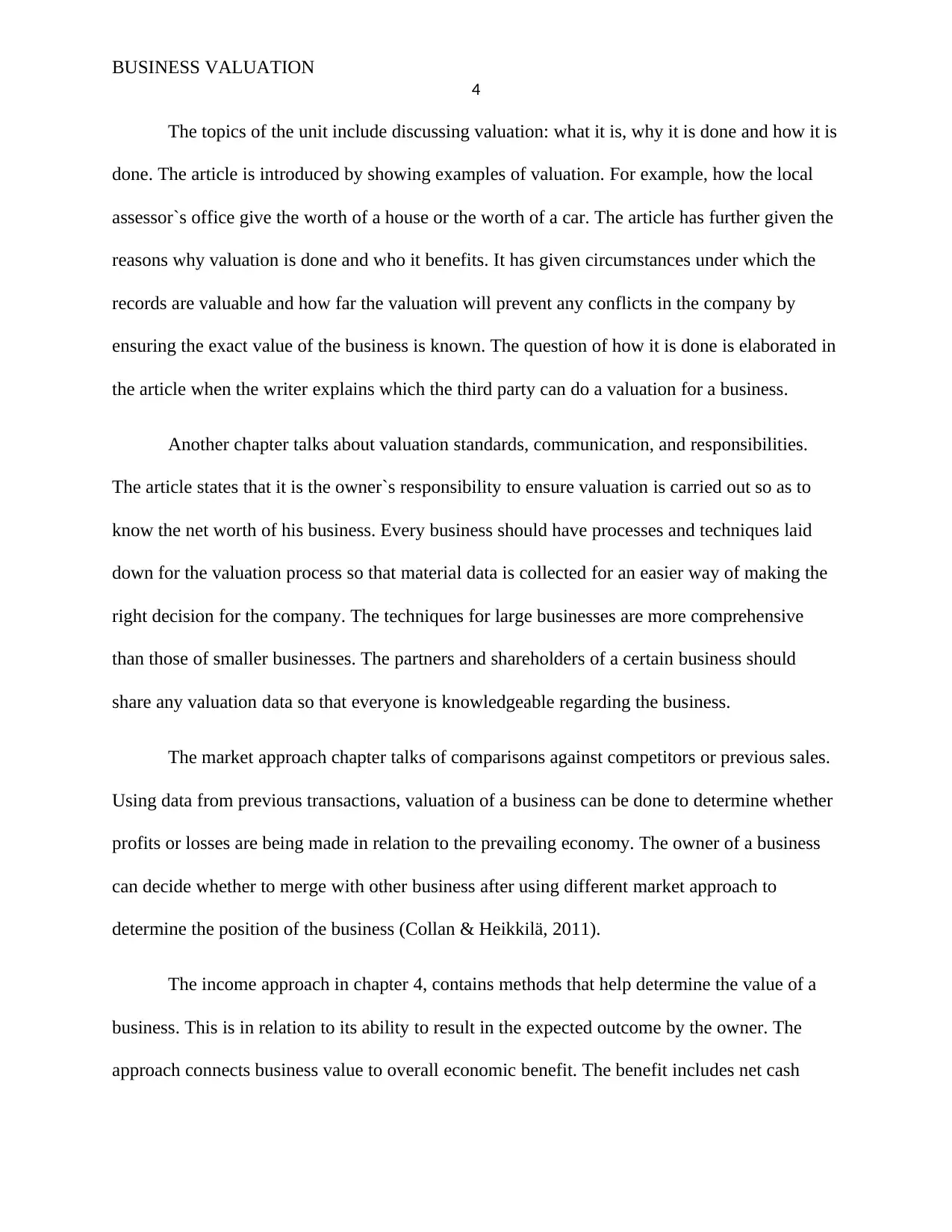
BUSINESS VALUATION
4
The topics of the unit include discussing valuation: what it is, why it is done and how it is
done. The article is introduced by showing examples of valuation. For example, how the local
assessor`s office give the worth of a house or the worth of a car. The article has further given the
reasons why valuation is done and who it benefits. It has given circumstances under which the
records are valuable and how far the valuation will prevent any conflicts in the company by
ensuring the exact value of the business is known. The question of how it is done is elaborated in
the article when the writer explains which the third party can do a valuation for a business.
Another chapter talks about valuation standards, communication, and responsibilities.
The article states that it is the owner`s responsibility to ensure valuation is carried out so as to
know the net worth of his business. Every business should have processes and techniques laid
down for the valuation process so that material data is collected for an easier way of making the
right decision for the company. The techniques for large businesses are more comprehensive
than those of smaller businesses. The partners and shareholders of a certain business should
share any valuation data so that everyone is knowledgeable regarding the business.
The market approach chapter talks of comparisons against competitors or previous sales.
Using data from previous transactions, valuation of a business can be done to determine whether
profits or losses are being made in relation to the prevailing economy. The owner of a business
can decide whether to merge with other business after using different market approach to
determine the position of the business (Collan & Heikkilä, 2011).
The income approach in chapter 4, contains methods that help determine the value of a
business. This is in relation to its ability to result in the expected outcome by the owner. The
approach connects business value to overall economic benefit. The benefit includes net cash
4
The topics of the unit include discussing valuation: what it is, why it is done and how it is
done. The article is introduced by showing examples of valuation. For example, how the local
assessor`s office give the worth of a house or the worth of a car. The article has further given the
reasons why valuation is done and who it benefits. It has given circumstances under which the
records are valuable and how far the valuation will prevent any conflicts in the company by
ensuring the exact value of the business is known. The question of how it is done is elaborated in
the article when the writer explains which the third party can do a valuation for a business.
Another chapter talks about valuation standards, communication, and responsibilities.
The article states that it is the owner`s responsibility to ensure valuation is carried out so as to
know the net worth of his business. Every business should have processes and techniques laid
down for the valuation process so that material data is collected for an easier way of making the
right decision for the company. The techniques for large businesses are more comprehensive
than those of smaller businesses. The partners and shareholders of a certain business should
share any valuation data so that everyone is knowledgeable regarding the business.
The market approach chapter talks of comparisons against competitors or previous sales.
Using data from previous transactions, valuation of a business can be done to determine whether
profits or losses are being made in relation to the prevailing economy. The owner of a business
can decide whether to merge with other business after using different market approach to
determine the position of the business (Collan & Heikkilä, 2011).
The income approach in chapter 4, contains methods that help determine the value of a
business. This is in relation to its ability to result in the expected outcome by the owner. The
approach connects business value to overall economic benefit. The benefit includes net cash
Paraphrase This Document
Need a fresh take? Get an instant paraphrase of this document with our AI Paraphraser
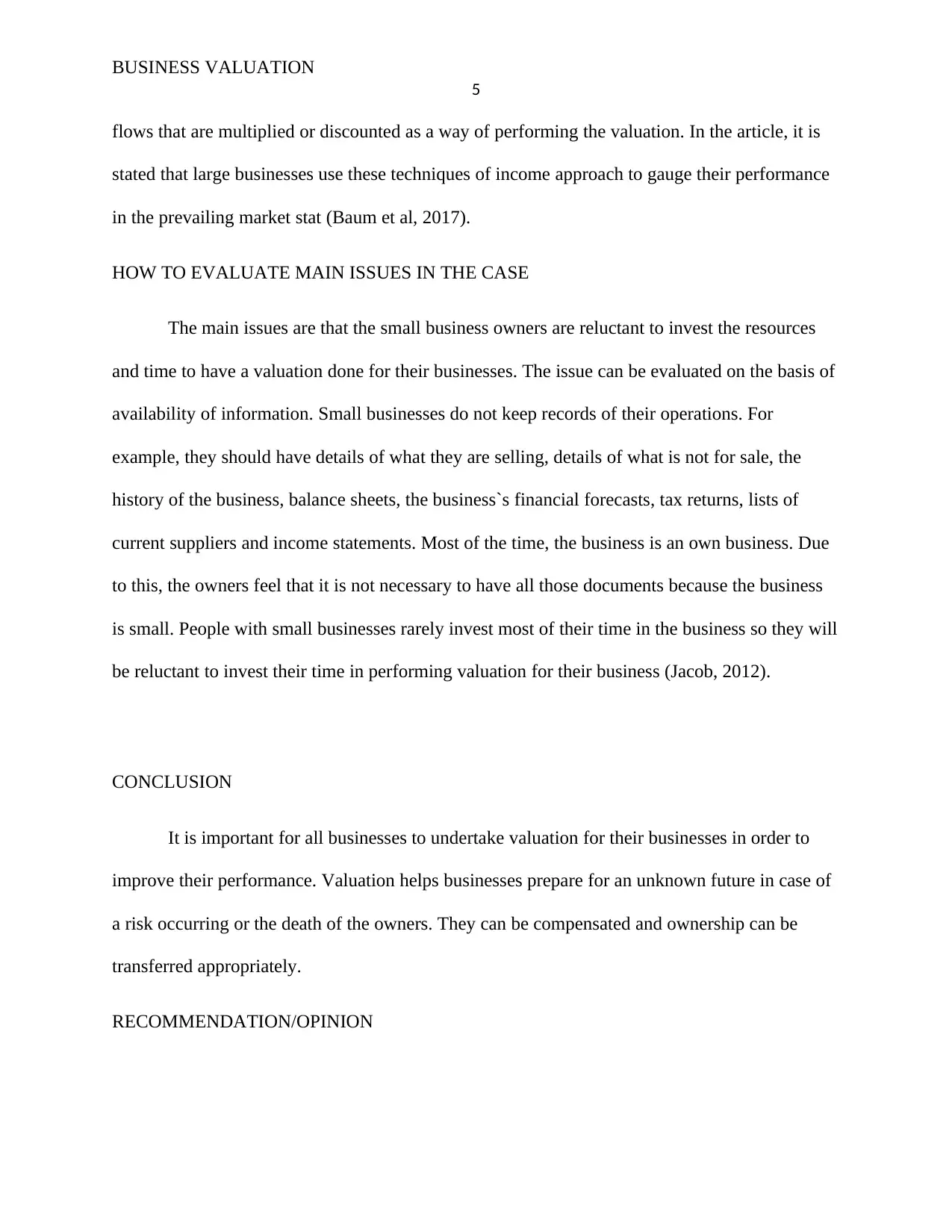
BUSINESS VALUATION
5
flows that are multiplied or discounted as a way of performing the valuation. In the article, it is
stated that large businesses use these techniques of income approach to gauge their performance
in the prevailing market stat (Baum et al, 2017).
HOW TO EVALUATE MAIN ISSUES IN THE CASE
The main issues are that the small business owners are reluctant to invest the resources
and time to have a valuation done for their businesses. The issue can be evaluated on the basis of
availability of information. Small businesses do not keep records of their operations. For
example, they should have details of what they are selling, details of what is not for sale, the
history of the business, balance sheets, the business`s financial forecasts, tax returns, lists of
current suppliers and income statements. Most of the time, the business is an own business. Due
to this, the owners feel that it is not necessary to have all those documents because the business
is small. People with small businesses rarely invest most of their time in the business so they will
be reluctant to invest their time in performing valuation for their business (Jacob, 2012).
CONCLUSION
It is important for all businesses to undertake valuation for their businesses in order to
improve their performance. Valuation helps businesses prepare for an unknown future in case of
a risk occurring or the death of the owners. They can be compensated and ownership can be
transferred appropriately.
RECOMMENDATION/OPINION
5
flows that are multiplied or discounted as a way of performing the valuation. In the article, it is
stated that large businesses use these techniques of income approach to gauge their performance
in the prevailing market stat (Baum et al, 2017).
HOW TO EVALUATE MAIN ISSUES IN THE CASE
The main issues are that the small business owners are reluctant to invest the resources
and time to have a valuation done for their businesses. The issue can be evaluated on the basis of
availability of information. Small businesses do not keep records of their operations. For
example, they should have details of what they are selling, details of what is not for sale, the
history of the business, balance sheets, the business`s financial forecasts, tax returns, lists of
current suppliers and income statements. Most of the time, the business is an own business. Due
to this, the owners feel that it is not necessary to have all those documents because the business
is small. People with small businesses rarely invest most of their time in the business so they will
be reluctant to invest their time in performing valuation for their business (Jacob, 2012).
CONCLUSION
It is important for all businesses to undertake valuation for their businesses in order to
improve their performance. Valuation helps businesses prepare for an unknown future in case of
a risk occurring or the death of the owners. They can be compensated and ownership can be
transferred appropriately.
RECOMMENDATION/OPINION
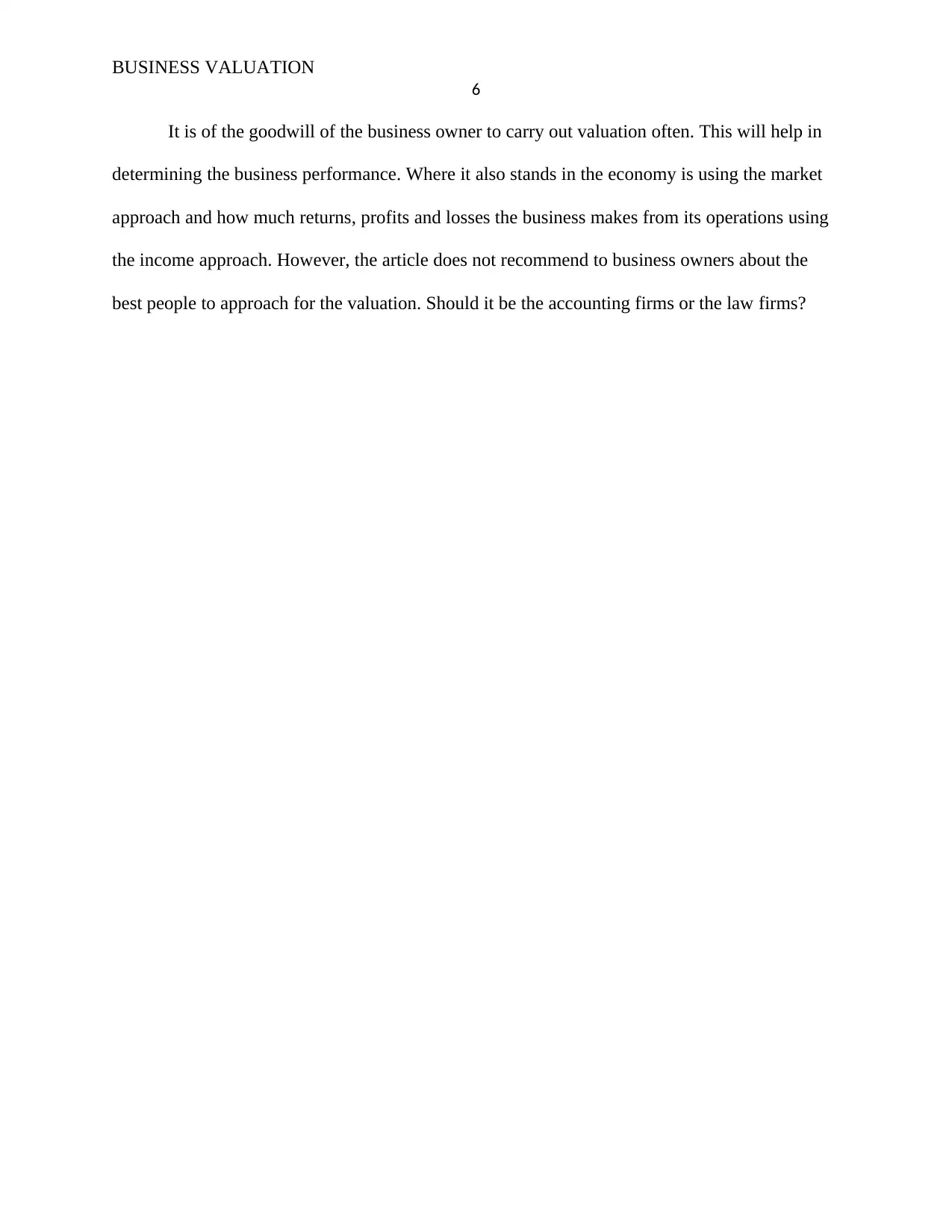
BUSINESS VALUATION
6
It is of the goodwill of the business owner to carry out valuation often. This will help in
determining the business performance. Where it also stands in the economy is using the market
approach and how much returns, profits and losses the business makes from its operations using
the income approach. However, the article does not recommend to business owners about the
best people to approach for the valuation. Should it be the accounting firms or the law firms?
6
It is of the goodwill of the business owner to carry out valuation often. This will help in
determining the business performance. Where it also stands in the economy is using the market
approach and how much returns, profits and losses the business makes from its operations using
the income approach. However, the article does not recommend to business owners about the
best people to approach for the valuation. Should it be the accounting firms or the law firms?
⊘ This is a preview!⊘
Do you want full access?
Subscribe today to unlock all pages.

Trusted by 1+ million students worldwide
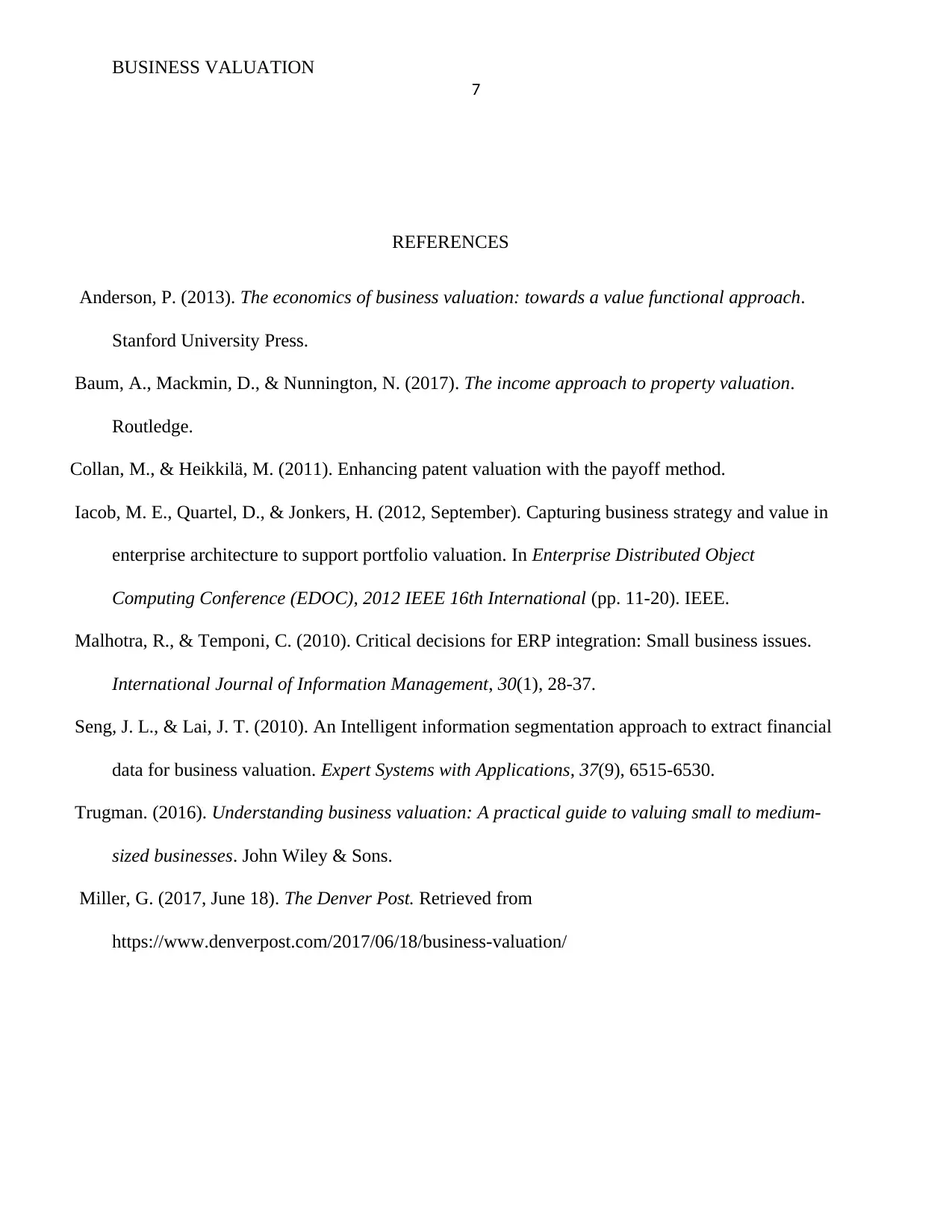
BUSINESS VALUATION
7
REFERENCES
Anderson, P. (2013). The economics of business valuation: towards a value functional approach.
Stanford University Press.
Baum, A., Mackmin, D., & Nunnington, N. (2017). The income approach to property valuation.
Routledge.
Collan, M., & Heikkilä, M. (2011). Enhancing patent valuation with the payoff method.
Iacob, M. E., Quartel, D., & Jonkers, H. (2012, September). Capturing business strategy and value in
enterprise architecture to support portfolio valuation. In Enterprise Distributed Object
Computing Conference (EDOC), 2012 IEEE 16th International (pp. 11-20). IEEE.
Malhotra, R., & Temponi, C. (2010). Critical decisions for ERP integration: Small business issues.
International Journal of Information Management, 30(1), 28-37.
Seng, J. L., & Lai, J. T. (2010). An Intelligent information segmentation approach to extract financial
data for business valuation. Expert Systems with Applications, 37(9), 6515-6530.
Trugman. (2016). Understanding business valuation: A practical guide to valuing small to medium-
sized businesses. John Wiley & Sons.
Miller, G. (2017, June 18). The Denver Post. Retrieved from
https://www.denverpost.com/2017/06/18/business-valuation/
7
REFERENCES
Anderson, P. (2013). The economics of business valuation: towards a value functional approach.
Stanford University Press.
Baum, A., Mackmin, D., & Nunnington, N. (2017). The income approach to property valuation.
Routledge.
Collan, M., & Heikkilä, M. (2011). Enhancing patent valuation with the payoff method.
Iacob, M. E., Quartel, D., & Jonkers, H. (2012, September). Capturing business strategy and value in
enterprise architecture to support portfolio valuation. In Enterprise Distributed Object
Computing Conference (EDOC), 2012 IEEE 16th International (pp. 11-20). IEEE.
Malhotra, R., & Temponi, C. (2010). Critical decisions for ERP integration: Small business issues.
International Journal of Information Management, 30(1), 28-37.
Seng, J. L., & Lai, J. T. (2010). An Intelligent information segmentation approach to extract financial
data for business valuation. Expert Systems with Applications, 37(9), 6515-6530.
Trugman. (2016). Understanding business valuation: A practical guide to valuing small to medium-
sized businesses. John Wiley & Sons.
Miller, G. (2017, June 18). The Denver Post. Retrieved from
https://www.denverpost.com/2017/06/18/business-valuation/
1 out of 7
Related Documents
Your All-in-One AI-Powered Toolkit for Academic Success.
+13062052269
info@desklib.com
Available 24*7 on WhatsApp / Email
![[object Object]](/_next/static/media/star-bottom.7253800d.svg)
Unlock your academic potential
Copyright © 2020–2026 A2Z Services. All Rights Reserved. Developed and managed by ZUCOL.





